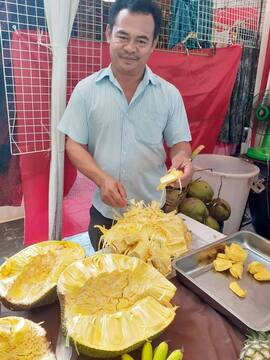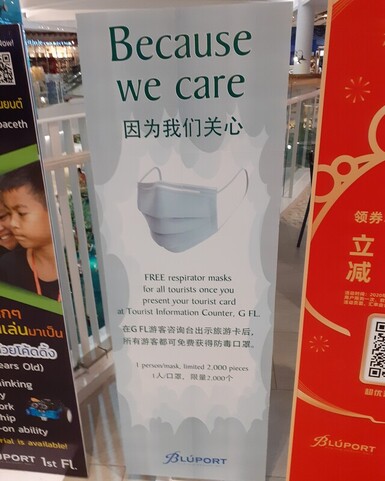We are chatting with Kohsoom (‘lotus’ in Thai), our favourite fruit lady on the beach in Hua Hin, Thailand, where we are currently staying.
Our first inkling not all was well on this side of the world was in early January, when we stepped off our flight in Bangkok, after travelling 24 hours---two flights and a four-hour bus ride --- from Toronto, Canada.
Bleary-eyed, jet-lagged, zombie-like, we barely noticed the extra health precautions at a gate near us. When we did look---because this was unusual activity---it was at the gate of an incoming flight from Wuhan, China. A handful of Thai health officials, dressed in protective clothing, wearing masks and carrying thermometers, were carefully screening passengers off that flight.
Thailand takes an economic hit
Last year, Thailand welcomed 10.99 million Chinese visitors; China provides the largest number of tourists (27.6% of the total). You can imagine the economic hit Thailand has taken since the spread of the coronavirus and the closing of its borders and air flights to Chinese visitors.
As of this writing, a report by Bangkok’s RHB Bank predicts that Thailand will lose US $3.51 billion because of the coronavirus and the resultant drop in tourism from China.
But back to the real people. We notice traffic in malls and restaurants is down; many department store sales encourage the visitor to spend. Eager for a sale, retail staff hover around a prospective customer.
Meanwhile, our fruit lady, one of Thailand’s hardest hit poor, works tirelessly on the beach. (see blog https://www.heatherrath.net/blog/the-fruit-lady-on-the-thai-beach ) For six years she (her husband now helps) serves customers on a small patch of sand every day of the week except Wednesday.
Mother to four children, three with her current husband, she is at the beach by 8 a.m. The couple sets up tables, an umbrella, a small grill for cobs of corn, tropical fruits, a blender for drinks, coolers for ice and a few chairs for customers. Tourists like to sit, eat, drink, and watch the two manage this small on-the-beach business.
Kohsoom and her husband serve and sell on the beach until 6:30 p.m. Their youngest child, Noon, plays and sleeps in the surrounding area while his parents work. Thank goodness as the sun moves overhead, the little stand sits in the shade.

At sundown they pack up, clean, and secure what belongings they leave on their space overnight. The next day at 8 a.m., they replay the same scenario. Average cost of their freshly prepared fruit (mango, papaya, jackfruit, pineapple, watermelon…) is 30 baht (about Cdn $1.20). That’s one long day of manual labour for little pay.
Kohsoom is worried. Not only the Chinese, but other tourists from other countries, are not coming. And she counts on each and every one to help feed and raise her family.

During the first week we were here, there seemed to be little reaction to the coronavirus news. Then, almost overnight, people (Thais and visitors alike) began wearing surgical face masks.
Should we get one? Even though several (of many) reports (“likely won't stop you from contracting the coronavirus, but that's not stopping some people worried about the risk from buying up as many as they can find”) claim masks are not the answer, try and tell that to someone who’s afraid of the virus.
What happened when we decided to go looking for masks? Just to be on the safe side? Sold out. As was hand sanitizer. We finally found a drugstore in a nearby mall and knew, from the long line-up outside, they still had masks to sell.

As of this writing, the coronavirus scare is alive and well in Thailand. What is fact or fiction makes no difference these days. Especially for the thousands affected elsewhere by the virus, some with tragic results.
So, we remain vigilant.
One curious factor though. Although Chinese tourism is down, the beach still remains crowded with farang, other white foreigners.
And no-one wears a mask on the beach.
 RSS Feed
RSS Feed